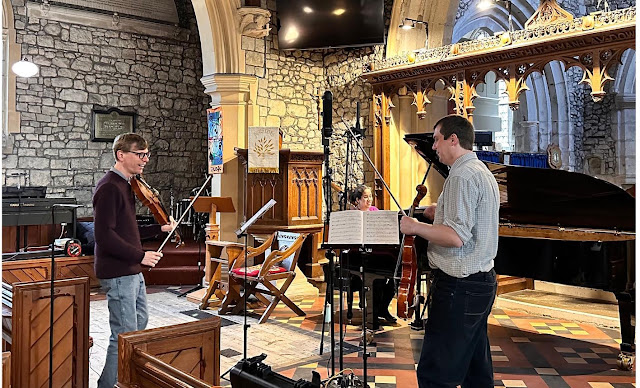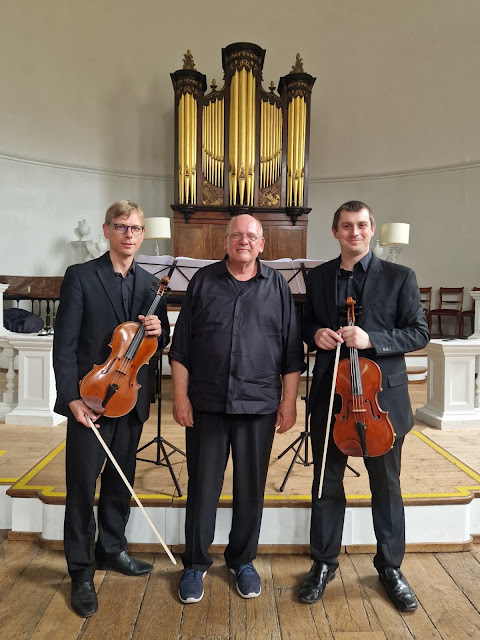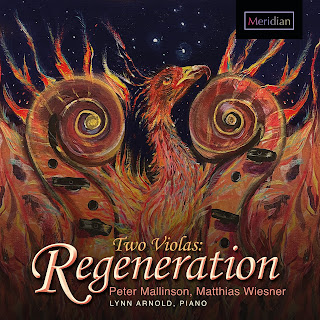 |
| Matthias Wiesner, Lynn Arnold & Peter Mallinson recording Two Violas: Regeneration at St Peter’s Church, Boughton Monchelsea, Kent in 2024 |
Viola players Peter Mallinson and Matthias Wiesner have been exploring the perhaps surprising yet remarkably fertile ground of music for two violas (both with and without keyboard). In March, they release their fourth disc, Two Violas: Regeneration on the Meridian label with pianist Lynn Arnold, features arrangements of Bach and Elgar, original works by York Bowen, Alexander Wunderer and Orlando Gibbons, alongside new pieces by Sally Beamish (herself a viola player, see my 2019 interview), Detlev Glanert, Raymond Yiu and Peter Letanka.
Peter explains that when they started exploring this repertoire, there were a few pieces that ‘floated their boat’ but they did not realise quite how much material there was, and that it was good to be able to showcase works that were far more than simply interesting fillers. They also began commissioning pieces and arrangements of existing material. Peter points out that many places, concert societies, need to have works in the programme by composers that people have heard of. After all, the line-up of two violas (with or without piano) is not an obvious one. If you say string quartet, people have a clear idea of the music, so having names people recognise is helpful. And Peter feels that they are nowhere near running out of repertoire.
The new disc’s theme is the loose one of Regeneration. All their discs have had a theme, but Peter admits that themes come second, repertoire comes first. For him, it is interesting finding different ways of grouping pieces together and such groupings can help people to think about the music in new ways. Each of the pieces on the new disc involves regeneration of one sort or another, though Peter admits that it is a fine line between inspiration and regeneration.
Raymond Yiu’s Three Shidaiqu Transcriptions revisits Chinese popular music. Shidaiqu is the name given to the style of music that originated in the 1920s when American jazz musicians went to work in dance clubs in Shanghai and collaborated with local folk performers. It was a musical form that Peter was not familiar with, an old genre that Yiu has revamped. The viola becomes the voice, making it a nice medium for Chinese popular music, a style that means a lot to Yiu. The same is true of Peter Letanka’s Gershwinian Nostalgia; both Letanka and Yiu grew up with the popular genre that they have regenerated, and in Gershwinian Nostalgia, Peter Letanka is also acknowledging both his jazz voice and where it comes from.
The Bach piece on the disc, Peter admits, is a bit of an oddity, playing with the fact that Baroque composers would routinely reimagine works with different combinations of instruments, so Iain Farrington has reimagined one of Bach’s Viola da Gamba Sonatas for two violas and piano. Also in the mix is the idea that Bach’s gamba sonatas are themselves reimaginings of earlier works, and one exists in a version for flute and keyboard.
For their earlier disc, A Tale of Two Violas [see my review], Peter and Matthias asked Iain Farrington to produce a version of Bach’s Brandenburg Concerto No. 6 (the one that features violas without violins) making it more like a trio sonata than two violas with keyboard reduction of the remaining instrumental parts. So now, Farrington has worked his magic on Bach’s Viola da Gamba Sonata in G minor, BWV 1029, creating an updated version of something from the past.
The Duo in G Major by York Bowen (1884-1961) and Duett in G by Alexander Wunderer (1877-1955) have not really seen the light of day much recently, and Peter feels that it is important to bring them to the fore. Peter first read about Alexander Wunderer in a book about the great English viola player, Lionel Tertis (1876-1975). Peter likes Wunderer’s music, finding it full of character and well-written for the viola (Wunderer was an oboist, and orchestral manager of the Vienna Philharmonic Orchestra). His Duett goes down well with audiences, particularly the spooky second movement.
Early music, Peter admits, can be something of a minefield when it comes to this repertoire. What is an arrangement after all? Simply playing the same music on a different instrument? Viola players often perform Bach’s Cello Suites, playing the same notes an octave higher, taking advantage of the fact that a viola’s strings sound exactly an octave above those of the cello. Peter points out that in the Baroque period, scores often did not specify the particular instruments required.
Late 18th and 19th-century repertoire for two violas is harder to find, yet it does exist. One name Peter mentions in our discussion is the Czech violinist and composer Anton Wranitzky (1761-1820). His teachers included Mozart, though Anton’s brother Pavel is perhaps better known, but Anton Wranitzky’s output includes a concerto for two violas. But a pair of violas together has its own particular sound and composers of the period exploit this when writing string quintets with two violas (as did Mozart and Beethoven) rather than two cellos. Not strictly two viola repertoire, but it shows the composers’ subtle interest, and Peter opines that Beethoven’s quintets are great fun.
One problem, however, is that a lot of the repertoire is not published, or in some cases is long out of print, reliant on getting hold of the music via connections. Also, this means that you might have a copy of the music but not have the rights to it. Alexander Wunderer’s Viola Sonata is published but not his Duett, and Peter feels that it would be wonderful if the Duett could be published. Peter only discovered the Duett because it was listed in a recital by viola players William Primrose (1904-1982) and Paul Doktor (1919-1989), and Doktor left his music collection to a contact of Peter’s. Composer James Friskin (1886-1967), husband of viola player and composer Rebecca Clarke (1886-1976), wrote an Elegy for Viola that was published yet almost disappeared. When Peter contacted the work’s publishers their master copy had unaccountably vanished.
Peter’s duo with Matthias started for very ordinary reasons. Both men joined the BBC Symphony Orchestra on the same day in 2012. On a tour to South Korea, the education department needed players and for logistical reasons, it had to be those who carried their instruments with them. Peter and Matthias volunteered and performed a piece for two violas. They found they enjoyed it and thought it fun to do concerts together as a contrast to their orchestral life, with new music and unfamiliar repertoire. So they looked at existing repertoire for two violas. There were pieces with connections to the BBC Symphony Orchestra, such as the Sonatina by Gordon Jacob (1895-1984) which was dedicated to two BBC Symphony Orchestra players. They started looking further with connections to other viola players, Lionel Tertis, Vadim Borisovsky (1900-1972), viola player in the Beethoven Quartet which premiered 13 of Shostakovich’s string quartets, and Fyodor Druzhinin (1932-2007) who replaced Borisovsky in the Beethoven Quartet, and for whom Shostakovich wrote his Viola Sonata. Then at concerts, they would be asked how people could find out more about this repertoire, but there was no single place to look. The question ‘what if’ led to their first disc, Music for Two Violas.
 |
| Matthias Wiesner, Detlev Glanert, Peter Mallinson |
The more they do, the more contemporary composers are interested. Sometimes composers hear them performing and offer pieces, whilst other composers, Peter and Matthias have asked for pieces, some with connections to the current BBC Symphony Orchestra such as Detlev Glanert.
The orchestra with conductor Semyon Bychkov gave the UK premiere of Glanert’s Weites Land (‘Musik mit Brahms’ for orchestra) at the 2019 BBC Proms and returned to the work, with conductor Joel Sandelson in 2023, and also in 2023, Bychkov conducted the BBC SO in the UK premiere of Glanert’s Prague Symphony – Lyrical Fragments after Franz Kafka, a BBC co-commission [see Colin Clarke’s review on Seen and Heard]
Peter and Matthias, with pianist Lynn Arnold will be launching the new disc at a concert on 14 March 2025 at All Saints’ Church, Jesus Lane, Cambridge, CB5 8BP, when they will be playing a selection of pieces from the disc. And there will be an opportunity to meet the musicians afterwards.
Full details from the TryBooking website.
Peter Mallinson and Matthias Wiesner’s Two Violas discography on Meridian Records
Music for Two Violas CDDE84641
- Gordon Jacob: Sonatina
- Fyodor Druzhinin: Sinfonia a Due
- Edmund Rubbra: Meditations on a Byzantine Hymn
- Frank Bridge: i
- Arrangements of Prokofiev, Pyotr Bulakhov and Khachaturian by Vadim Borisovsky
A Tale of Two Violas CDE84652
- John Hawkins: At Two
- Lionel Tertis: Variations on a Passacaglia by Handel
- Arrangements of Schubert & Dowland by Tertis; arrangements of G.B.Vitalia and Bedrich Benda by Borisovsky; Frank Bridge edited and completed by Simon Rowland-Jones
- Bach: Brandenburg Concerto No. 6 arranged by Iain Farrington
Two Violas Now CDE84667
- music by Deborah Pritchard, Edwin Roxburgh, Simon Rowland-Jones, John Alexander
Two Violas: Regeneration CDE 84684
- Bach, arr. Iain Farrington: Sonata in G minor BWV 1029
- Sally Beamish: Prelude & Canon
- Orlando Gibbons: Two Fantasias
- Detlev Glanert: The Pleiades
- Raymond Yiu: Three Shidaiqu Transcriptions
- York Bowen: Duo in G major
- Alexander Wunderer: Duett in Gamba
- Peter Letanka: Gershwinian Nostalgia
- Edward Elgar, arr. Dan Jenkins: The Wild Bears
The blog is free, but I’d be delighted if you were to show your appreciation by buying me a coffee.
Elsewhere on this blog
- Real musical riches: Thea Musgrave’s Mary, Queen of Scots returns to the UK after an embarrassing period of neglect – opera review
- Philip Glass Festival: the Hallé & Royal Northern College of Music proudly mounted a three-day mini-festival – concert review
- Reclaiming Love: An Alternative Valentines Song in the City’s contribution to LGBT History Month including rare Smyth & Grieg plus Brahms’ Love Song Waltzes – review
- An enormously intense, personal experience: composer Michael Zev Gordon on writing A Kind of Haunting, his new piece inspired by his family’s experience of the Holocaust – interview
- Letter from Florida: It is hard to imagine any orchestra getting closer to playing as one, though, than The Cleveland Orchestra – concert review
- A woman on the edge: Cherubini’s Médée in the original French version yet given a powerful modern twist with Joyce El-Khoury – opera review
- To create modern culture through the thoughts of the past: George Petrou artistic director of the Göttingen International Handel Festival introduces this year’s festival – interview
- Another crazy day: Joe Hill-Gibbins’ production of Mozart’s The Marriage of Figaro returns to ENO reinvigorated – opera review
- My Heart’s in the Highlands: the debut recital from tenor Glen Cunningham mixes Stuart MacRae’s new songs with other composers with ‘Scotland in Mind’ – record review
- Unbearable intensity: musically strong revival of Janáček’s Jenůfa at the Royal Opera with incoming music director Jakub Hrůša on searing form in the pit – opera review
- Home




.jpg?w=670&resize=670,446&ssl=1)





